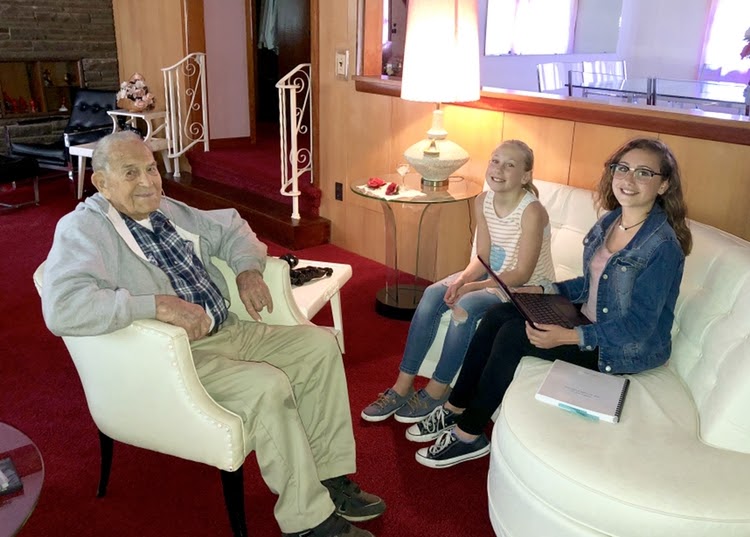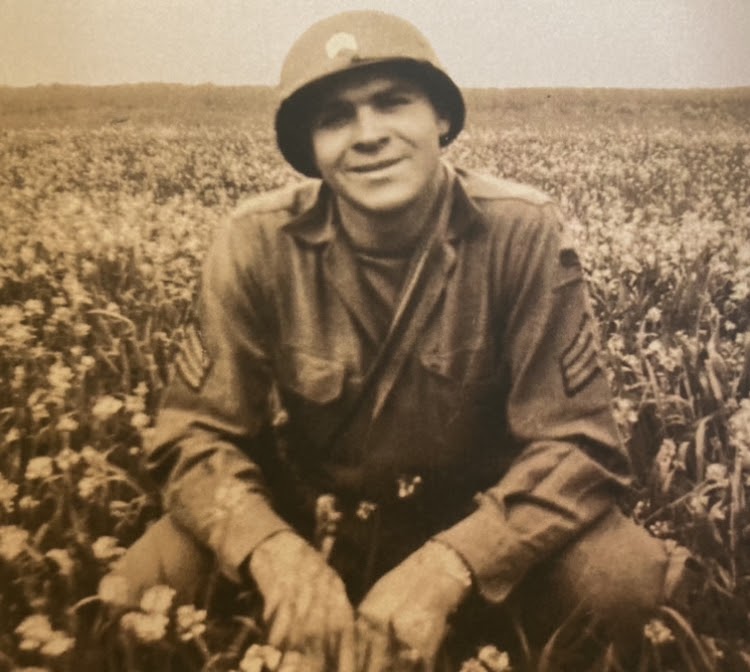Hometown Heroes: Farm-boy-turned-soldier Sgt. John F. Marshall told of his experience during World War II
This photograph is of Sgt. Marshall in a field at some point during the war. This image is also the front cover of his book.
June 24, 2021
Two years ago, in June of 2019 I was a curious seventh grade girl with an opportunity like no other. Assigned a project on World War II for my Social Studies class, I chose to sit down with a World War II veteran and ask him about his experience. Gaining not only the information I needed for my project, I also gained an even higher respect for our hometown war heroes as well as a strong realization that history cannot be forgotten.
Being that he is as interested in American history as I am, I immediately told my dad about the project that had just been introduced. When I went into a deeper explanation, detailing that we were to select a specific event from the war to research, he proposed the idea that I speak with a man he met some years prior while he was still working as a police officer.
My dad responded to a 9-1-1 call that had ended up being an accident. When he arrived at the Lincoln Park home, he found an elderly man who was clearly in no state of duress or danger. It was then that my father spied a “Purple Heart” license plate, only awarded to those who were injured in battle. So, he asked the elderly man what war he was in. His reply? “World War II”.
The veteran, Staff Sergeant John F. Marshall, was a tank commander during World War II and author of A Fighter Tanker’s Story. Mr. Marshall grew up on a farm in Lincoln Park, New Jersey until he was drafted into the army in September of 1944 as a replacement after D-Day.
In order to prepare for my interview, my dad handed me a thick book complied of printer paper and held together by a black spiral. I looked at it in my hands and thumbed through the pages. It was his manifesto, his own account of his experience during the war. In April of 2020, that manifesto became a novel entitled A Fighter Tanker’s Story: As Told by Staff Sgt. John F. Marshall.
During the filmed interview with Mr. Marshall, his body language was in no way uncomfortable; spry for 98-years-old, he was eager to tell me everything I wanted to know about the war. He had healed tremendously since the horrors of World War II and it was evident in his demeanor. Interestingly, he paired his poignant story with an almost humorous undertone.
Oftentimes, war veterans suffer from Post Traumatic Stress Syndrome (PTSS) and would rather do anything else other than talk about their war experiences. But, what set Mr. Marshall apart from every single veteran I’ve heard of, was that he wanted to tell his story. He wanted to tell me everything that went on in Bastogne and the Hürtgen Forest. He showed me artifacts he took home with him from the war; a compass from a Hitler youth camp, a grenade. He showed me tons of photographs. I was totally captivated by his willingness to share his experiences.
When he was drafted, he was 24-years-old; much older than the wide eyed 18-year-old recruits and the 16-year-olds that lied about their ages. He had no military experience, he worked on farms. Just before he was drafted, he got a job working at a Defense Plant where he made airplane parts. Yet the American Army did not care whether you had no experience, or all the experience in the world. So, he was placed in the 707th Tank Battalion; an outfit that was part of the Tank Destroyer Unit.
When I asked Mr. Marshall if the death of his Tank Commander (before he was appointed Commander), Mike Kosowitz, affected the realization of his own mortality, he stated “You see it, and it happens and you have to have a feeling of invincibility, that it wasn’t gonna happen to you. I’ll be honest with you, you had to live with something like that, that it happened to him, he’s dead in your arms, but it ain’t gonna happen to me.”
It was an interesting perspective that he offered, especially the explanation of the feeling of invincibility he lived with. I supposed they were terrified, reciting over and over in their minds I’m going to die.
Mr. Marshall had quite the matter-of-fact attitude when answering the questions as he “tells it like it is”. When asked if his job at the Defense Plant contributed to his placement in the Tank Destroyer Unit, he stated plainly, “Absolutely not. They didn’t care who you were, what you were. Dumb or smart.”

After the interview with Mr. Marshall, I flipped back through the pages of Mr. Marshall’s original manifesto. There was one quote that I just couldn’t get out of my mind. It was so moving, so real. It was human. He wrote “It was a pitiful scene, two men carrying a dead man; a couple of severely wounded men helping each other, they say, “Men don’t cry” but they do whether it’s from frustration, hopelessness or pain – men do cry.” I never fully considered the emotional side to war. I always thought that there was no time for tears, but there was and that made it all the more real.
I’m still fascinated by Mr. Marshall’s story almost three years later, and I’m thankful I have the video of our interview as I will have that for the rest of my life. And as for Sergeant Marshall? He will be 101 in July, his mind still sharp and his contribution to history still alive, as it will eternally remain. I am forever grateful for the insight into war that he offered me. I had always foolishly believed that war was simply tactical and mechanical; just men shooting at one another until someone calls it quits. But war is more than that. It is raw, emotional, human.




